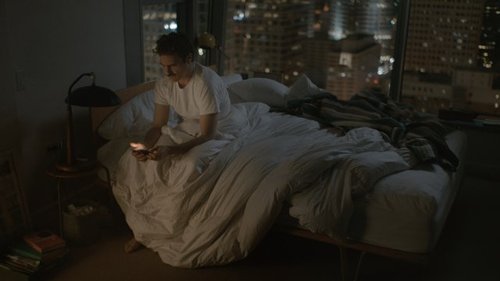This review was originally published in January 2014. The images are from the film and are not my own.
This isn’t so much a review as it is an attempt to describe my personal reflections upon seeing Spike Jonze’s excellent new film Her. In case anyone wonders after reading reading my thoughts, I do recommend seeing this complex and beautiful analysis of a modern human condition and I plan on returning to it again.
Arcade Fire’s latest album Reflektor has been playing almost non-stop. I’m a little late getting into it (the album came out just before Christmas music season) but the timing is perfect, since Arcade Fire also scored Spike Jonze Her. And it turns out that the themes that the album and the film explore are similar, as other reviewers have pointed out. Both wrestle with a modern problem, the challenge of a relationship that is sustained by technology
The film effortlessly realizes a possible not-to-distant future where slick software is built into everyday hardware, and where the auditory is emphasized over the visual, especially in the way we use our computers. In this world no one minds who talks to their computer while on the crowded subway, in the busy square, or even at work. And this is all captured by a shallow focus and detail rich cinematography that complements beautifully the aesthetics of that world.
The acting is equally effortless. Joaquin Phoenix plays the melancholy Theodore who, despite both his vocation as a letter writer and the long standing friendships he enjoys, finds himself alone at night in his light-filled apartment, sleepless and turning to the pale light of his constant companion, his phone.
As I watched this scene play out, I realized that I must not be the only insomniac who turns to his phone for relief. Mind you, the film was intensely personal to me in many other aspects I shouldn’t be surprised. Like how Theodore enjoys a long-standing, unromantic friendship with his friend Amy and how the person with whom he grew up and shared so many memories with is now distant and hard to reach.
And so we are brought to the central message of this film: real human relationships are much messier then artificial ones, yet satisfy in ways the others never could. Theodore’s relationship with his wife Kathy stretches far into their past, as we are gradually shown through flashbacks and memories. The two grew up together, studied together, and are so intertwined as personalities and friends that their lives became inseparable. So when their marriage finally falls apart, the unraveling is so painful, it takes Theodore “three months to write the letter T on the divorce papers.” The scene where he finally finishes writing his name while she signed hers across the table was painfully real, merging Theodore’s memory with reality and showing the tragedy that is two people so joined together split apart.
But Theodore was previously reluctant to sign those papers (“we’ve been married so long”). It wasn’t someone who encouraged him to move on, it was something. His new operating system is also his new partner and the realization of the digital relationships that kept him awake at night on his previous phone. Now to be fair, Samantha, his OS, is voiced by Scarlet Johansson, and is a captivating personality. And their chemistry together is so effortlessly realized that I had to constantly remind myself that it was just a performance. On paper too, this concept courts cliche. But on the screen it is realized with a tenderness and poignancy that is beautiful to watch.
"You’ve always wanted a wife without the challenges of actually dealing with anything real" Theodore’s ex claims. "I’m glad that you’ve found someone." Part of the film’s brilliance is Theodore and Sam’s relationship it is actually more complicated then that. But as captivating and satisfying as Samantha is, in the end she is just a machine. Unlike her claim that humans and computers are both evolved matter and therefore the same, the truth is, humans are distinct and separate. Samantha is a replacement, a replacement that was not meant to be.
The more I think about it, the more I think the anthem for the movie is Arcade Fire’s song Porno. The song explores the temptation that is porn and the damage it causes in relationships and in lives. Porn is a replacement of something good for something that on the surface appears satisfying. “We are only here briefly, and in this moment I want to allow myself joy” a friend of Theodore’s says in the film, but this joy that she is seeking, as layered and alluring as it is, is ultimately artificial. And when Theodore has aural sex with Samantha, it is the culmination of the aural internet sex that he experimented with online earlier, a cheap substitute for the real thing, unnatural and wrong.
So there something to learn from this masterpiece of a movie. There is superficial matter that is itself beautiful, alluring, and complex, but it can distract us from who we should be focusing on. There are relationships that are romantic as well as long-lasting friends and these will be tested, tugged at, and even torn. But they are worth fighting for and maintaining, even in our digital age. As Arcade Fire sings,
"I know you’re living in my mind
It’s not the same as being alive.
If telling the truth is not polite
Then I guess we’ll have to fight.”



